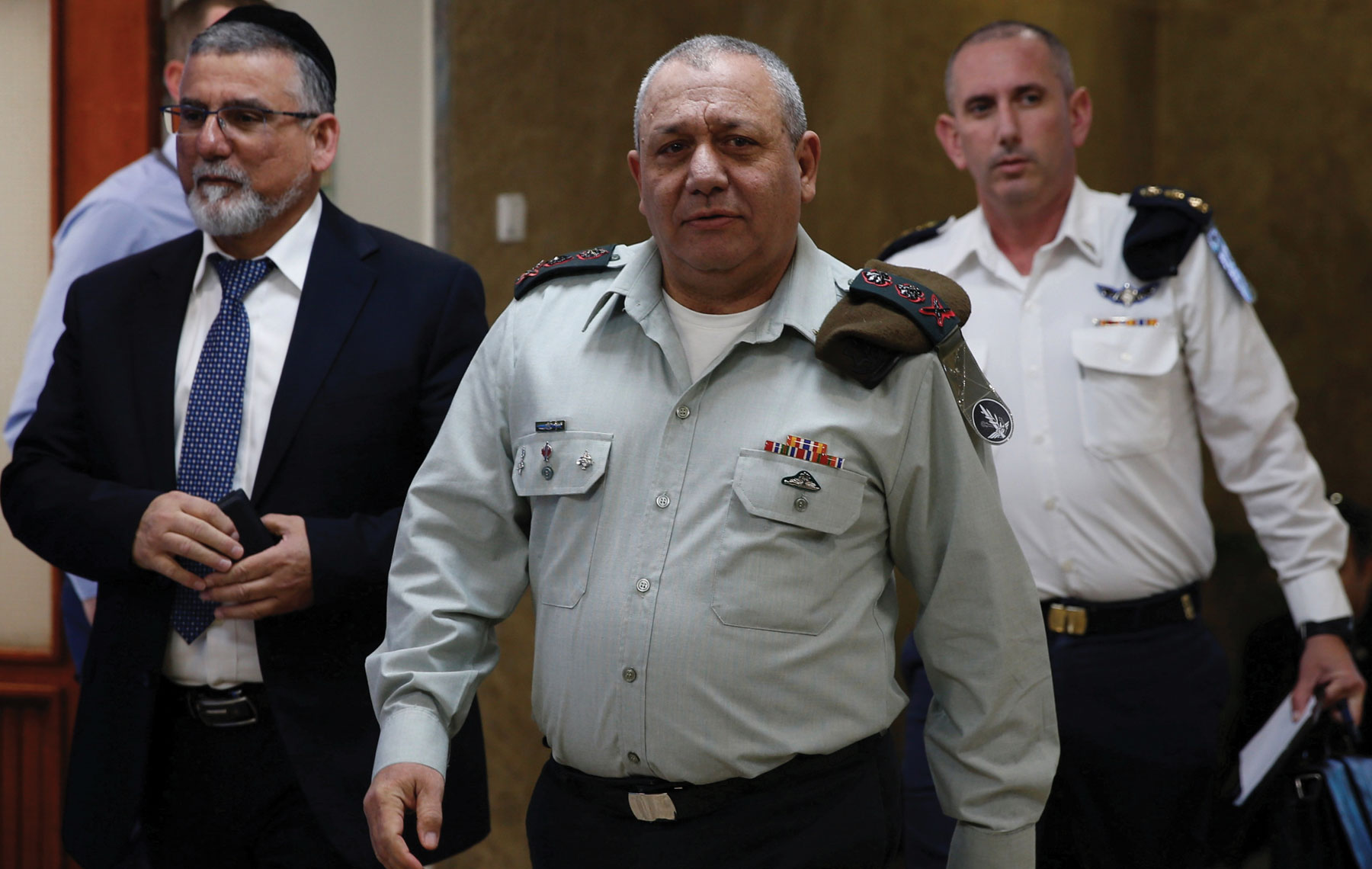 Israeli Chief of Staff Lieutenant-General Gadi Eizenkot arrives to the weekly cabinet meeting in Jerusalem; Photo by Ariel Schalit/Reuters
Israeli Chief of Staff Lieutenant-General Gadi Eizenkot arrives to the weekly cabinet meeting in Jerusalem; Photo by Ariel Schalit/Reuters Maj. Gen. Gadi Eizenkot is a stocky, unassuming, man. He was born and raised in Israel’s periphery. Never an aristocrat, never a prince, he is “a person’s person,” “a soldier’s soldier.” Earlier this week, he ended a four-year term as Israel Defense Forces (IDF) chief of staff, his career celebrated, his character admired. Will he also end up being a politician, many asked. Noooo — many of his friends hurriedly said. He is much too decent to become a politician.
Eizenkot was a down-to-earth chief of staff, rarely seeking the limelight. Was he a good general? To be honest, such things aren’t easy for a layman to determine. Many of the actions for which he was responsible are classified. Many of his initiatives will bear fruit only with time. Many of his decisions can only be judged when new realities emerge.
To give an example: Eizenkot invested a lot of his energy in combatting Iran’s attempt to establish a base in Syria. He was, as Bret Stephens described it in a New York Times interview, “the first Israeli general to take Iran head on, in addition to fighting its proxies in Lebanon and elsewhere.” Obviously, Stephens admires him for that — as most Israelis do. But that battle is still ongoing, and it’s not known how it will end. When it does end, determining the exact contribution of each leader to the success (or failure) of the mission will be difficult. What is Eizenkot’s part, compared with that of Prime Minister Benjamin Netanyahu, Defense Minister Moshe Yaalon, Defense Minister Avigdor Lieberman, the next Chief of Staff Maj. Gen. Aviv Kochavi or Northern Command’s Maj. Gen. Yoel Strick?
Another example: Eizenkot convinced the government that launching a military operation in Gaza would be a mistake. His position, and Netanyahu’s ultimate decision to take his advice, ignited the political crisis whose ultimate result is the upcoming election (Lieberman quit, shrinking the size of the coalition, and making the election the next logical step). Was restraint in Gaza the right call? Only time will tell. In fact, not even time. A decision to refrain from action is sometimes necessary, just to make sure that all options were exhausted before a decision to go to war.
If so little is known, why is Eizenkot praise-worthy? Because he was well liked most of the time by most Israelis because he was trusted. In Israel, the chief of staff is not a distant professional, a war expert. Of course, his abilities as a soldier are of great importance, but his abilities as a public figure are no less important. The Ramatkal (the Hebrew term for chief of staff) is a family member. He is our uncle general, commander of our children (in my case, two boys under Eizenkot’s command). He decides if these young people go to war, and when and why. Israelis know that sometimes war is necessary, but need to trust their uncle general that he will enter into war only when war is essential.
“Gadi Eizenkot was well liked most of the time by most Israelis because he was trusted.”
Eizenkot’s role as a public figure was paradoxical. He was successful in this role by avoiding publicity. He rarely gave interviews, rarely made bombastic statements and rarely attended galas, parties or glitzy events. He did not play the mass media “fame game.” He didn’t seem polished and slick. He didn’t project the image of a politician in uniform or a diplomat wannabe, like some of his famous predecessors.
When a general isn’t seen as a politician or a soon-to-be politician, it doesn’t necessarily make him a better soldier. But it does make him a better Ramatkal. It makes him better at making the people whose security depends on him trustful. Can we be certain that he made all the right decisions? Hardly. Can we be sure that he stirred the IDF toward victory? No, we can’t. But we can be certain that he made his decisions in good faith and without misguided motives.
Shmuel Rosner is senior political editor. For more analysis of Israeli and international politics, visit Rosner’s Domain online.























 More news and opinions than at a Shabbat dinner, right in your inbox.
More news and opinions than at a Shabbat dinner, right in your inbox.